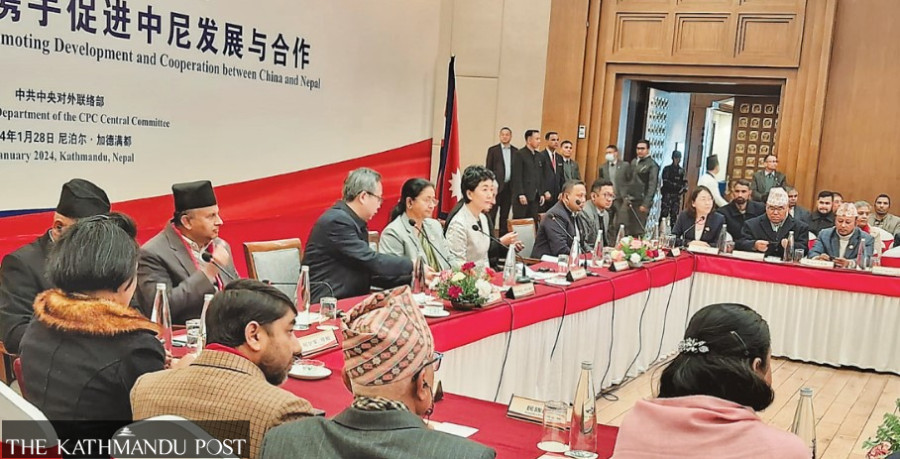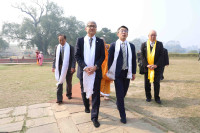National
China says rivals trying to sabotage its ties with Nepal
Visiting Chinese leader asserts BRI is not a debt trap and expresses concerns over investment climate.
Anil Giri
In an unprecedented move, visiting Chinese leaders have publicly claimed that certain countries are trying to destabilise the good relations between Nepal and China, while some elements are also defaming the Belt and Road Initiative by calling it a ‘debt trap’.
During an interaction with second-rung leaders of major political parties represented in Parliament, Sun Haiyan, the vice minister of the International Liaison Department of the Communist Party of China, alleged that some countries are trying to disrupt development cooperation between Nepal and China and defame bilateral relations.
“…Some criticise our relations. Some are trying to sabotage our bilateral relations and some have increased activity against China,” Sun said during a consultative conference in Kathmandu between Nepali political leaders and Communist Party of China. The conference was the first of its kind to happen in Kathmandu.
Some Nepali leaders, after the conference, labelled Sun’s statement “belligerent” and stated that the Chinese leaders typically would not use such direct language in public discussions.
Yes they would use such ‘direct and aggressive’ language during private conversations, but never in public forums like this, two leaders who took part in the conference told the Post. “It seems the Chinese are not happy with the current state of relations with Nepal or the way they are being publicly projected, both in and outside Nepal,” one of the participants said.
“They may feel a threat from Nepal, or they could have sensed that some external forces are trying to create a rift between Kathmandu and Beijing.”
She also quietly communicated to Nepali leaders not to take sides while pursuing foreign policy.
Sun skillfully asked Nepali leaders to avoid being too close to Americans and Indians, a CPN (Maoist Centre) leader said. “Earlier they used to convey such concerns behind closed doors, but now they are saying it in public.”
“We have good relations with political parties of Nepal, but some elements do not want to see them flourish,” Sun said.
Second-rung leaders from all national parties and members of the international and foreign relations departments of major parties were present at the conference, where one leader of each party represented was asked to speak on Nepal-China ties.
In her speech, Sun told party leaders to focus on three things: Nepal-China ties, and fostering and enhancing these ties in the changing context; the type of relations needed in the future; and the role Nepali political parties can play to strengthen bilateral ties.
Except for UML General Secretary Shankar Pokhrel, no other leader at the conference directly addressed Sun’s topics, even as they committed to boosting relations with China, expressed Nepal’s desire to benefit from China’s economic growth, and reaffirmed their commitment to ‘One China’ policy as well as the Belt and Road Initiative.
Sun also expressed concerns over Nepal’s investment climate, saying it is not favourable for investors, and urged party leaders to diversify infrastructure and facilitate Chinese investment.
Both before coming to Kathmandu and after she landed here, Sun held two separate rounds of talks with Chinese investors as well as Nepali traders doing business with China.
While complaining about growing geopolitical competition in Nepal, she tried to give a message that some powers do not want good relations between Nepal and China, but both sides have to maintain unity, trust and mutual relations so that they can collaborate in the face of challenges.
Without naming the US, Sun said that some are building alliances and fueling regional tensions.
“Some have increased their activities against China, and these external forces come and go, but Nepal-China relations should be strengthened. We are capable of addressing those challenges,” Sun said without mentioning any specific geopolitical tensions in different parts of the world and their possible implications on the Sino-Nepalese ties.
Chinese Ambassador to Nepal Chen Song, while highlighting the details and economic status of cooperation between Nepal and China, stated that China is ready to invest in game-changing projects.
He queried the Nepali leaders about why the same Chinese companies, which were completing projects in other countries within set deadlines, have been unable to do so in Nepal.
“We have to find out why projects undertaken by the Chinese are getting delayed,” said Chen, adding, “Is it only due to us? No. You have to assess it.”
Sun had earlier said that there were other factors behind the Covid pandemic for the delay in projects.
Ambassador Chen also expressed concerns over ‘negative reporting on the BRI’ by a section of the Nepali media. Chen said there is negative information about China and the BRI, “but we don’t want to disclose where they are coming from.” Also, he did not mention which media outlets have been spreading wrong messages about the BRI or Nepal-China ties.
“An ambassador should not speak so frivolously without clear evidence to back up his words,” a UML leader told the Post. “Making such unfounded statements is unbecoming of an ambassador. They should understand that Nepali media is free and reports by keeping in mind the fundamental interests of the country. The same is true of Nepali political parties.”
“Many wrong and negative messages are spreading in Nepali media. Several misleading and baseless news are there about Nepal-China relations. Very wrong messages are spreading outside about Nepal-China relations. BRI is a grant also, it is not entirely debt. Nepal’s external debt is only three percent of its GDP, but there is misinformation circulating that Nepal is falling into a debt trap,” he said.
Particularly in relation to the Pokhara International Airport built with a Chinese loan, some national and international media outlets have reported that the project could turn into a ‘white elephant’ due to Nepal’s inability to pay back Chinese loan and interest.
While expressing his concerns over timely completion of China-funded projects or those undertaken by Chinese contractors, the Chinese envoy suggested major parties of Nepal to come together and collectively find a way out.
At the same time, the ambassador announced that China has approved 150 new scholarships for Nepali students at various Chinese institutions.
It was UML General Secretary Pokhrel who later tried to assuage Chinese concerns. “Not only the Chinese, other development partners and donors have also faced similar problems in Nepal,” said Pokhrel.
“We need to resolve our structural problems that are hindering developmental efforts. There are ups and downs in international relations, but we are committed to advancing our relations with our neighbours. We accept their support and assistance. You need not be worried,” said Pokhrel while suggesting Chinese leaders to complete the projects committed by them, be it road or rail or infrastructure related projects.
He told the Chinese leaders that Nepal expects commencement of committed projects, including the second Ring Road expansion (in Kathmandu), outer Ring Road, hydropower projects, transmission lines, and the Tokha-Chhahare tunnel. Pokhrel also urged the government to take initiatives to execute projects under the BRI.
“If you have any confusion regarding our stance on international relations, it is our responsibility to give clarification,” said Pokhrel. “Nepali leaders may compete during elections, but they also hold regular discussions and collectively reach nuanced conclusions on key issues.”
Vice-chairman of the National Assembly Urmila Aryal, UML’s Pokhrel, Nepali Congress leader Shashank Koirala, Shishir Khanal of the Rastriya Swatantra Party, Sagun Sundar Lawoti of the Rastriya Prajatantra Party as well as Arjun Thapa of Janata Samajbadi Party reaffirmed Nepal’s commitment to One China policy. All of them said Nepal was prepared to benefit from China’s economic success and to seek more of its support in Nepal’s development endeavours.
Koirala said the Congress is willing to work with China in order to further Nepal’s development initiatives.




 15.12°C Kathmandu
15.12°C Kathmandu















